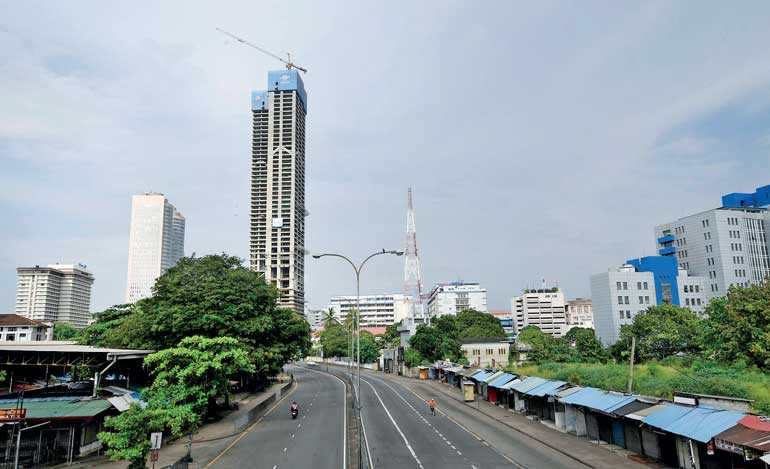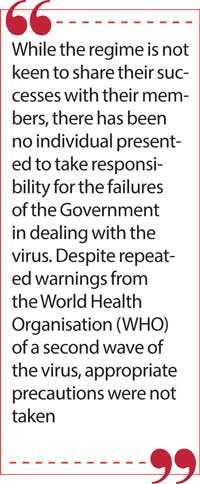Monday Feb 16, 2026
Monday Feb 16, 2026
Wednesday, 9 December 2020 00:00 - - {{hitsCtrl.values.hits}}

In Sri Lanka the success of politicising the COVID-19 outbreak was seen through their victory at the polls and the subsequent deflection of public anger. However, this may very well be short-lived if the Government is unable to provide a roadmap to post-COVID recovery – Pic by Shehan Gunasekara
The COVID-19 pandemic struck the world at a point when political and geo-political upheaval was upon the global populace. From elections, trade wars and withdrawals from common markets, 2020 was  shaping up to be a turning point in modern history. The arrival of COVID-19 quickly overshadowed these issues.
shaping up to be a turning point in modern history. The arrival of COVID-19 quickly overshadowed these issues.
In the United States of America the political circles were preparing for a Presidential election that promised to be one of the most divisive in the recent past. The importance of the election had been highlighted by the ongoing trade war between the US and China, which had seen rising prices of goods and job loss in the US.
Over in the United Kingdom (UK), the British politicians were preparing for a final year of negotiations with their counterparts in the European Union (EU), as the UK prepared to finalise their withdrawal from the common market.
In Europe, governments were faced with battling growing Islamophobia in their respective countries. While attempting to combat rising extremism, fuelled by growing racism and widening inequality, these administrations were forced balance the interests of their vote bases and a sense of decorum towards increased immigration within their borders.
In March embattled politicians around the world were given a reprieve. Their attentions turned to the spread of the COVID-19 virus which was fast enveloping Asia, Europe and the US.
In Sri Lanka, the Rajapaksa Government had just taken office, having secured a resounding victory at the 2019 Presidential election. Faced with a mountain of electoral pledges and an uncertain economic outlook, the Government was in need of a swift political victory to satisfy the demands of their voters. Having been elected on a platform of national security, the onset of a pandemic in the country appeared to have provided the perfect opportunity for the new Government to show their mettle.
The arrival of the COVID-19 pandemic saw the administration revert to a war-time footing of enforced curfews and reliance on the military. With police and military checkpoints setup around the country, areas declared “isolated” and the overall message that the country was waging a war against the virus; support for the Government was solidified.
An added incentive for the Rajapaksa regime was the fact that a General Election was around the  corner, having postponed the elections due to the outbreak. The depiction of having successfully handled the crisis would almost certainly ensure a resounding victory at the polls.
corner, having postponed the elections due to the outbreak. The depiction of having successfully handled the crisis would almost certainly ensure a resounding victory at the polls.
The Government was quick to deploy the services of Basil Rajapaksa, the younger brother of the President and the political operative credited with victory at the 2019 Presidential Election. Handed the responsibility of heading up the ‘Presidential Task Force on Continuous Supply, Operation and Coordination of Essential Services,’ the younger Rajapaksa announced an ambitious plan of door-to-door distribution of food to every household in the country.
The decision to hand over the distribution of essential goods to the founder of the Government’s party was heavily criticised by Opposition members. Accusations arose that Government supporters were being prioritised in the distribution chain. These allegations were further fuelled by the decision to distribute Rs. 5,000 to selected households, the selection of these household was made by local government authorities with little or no oversight.
Within 49 days the Government lifted the nationwide curfew and declared “victory” over the virus. This provided them with a foundation for their electoral campaign. Similar to the rhetoric propagated following the end of the war in 2009, the Sri Lanka Podujana Peramuna camp likened their success in quelling the virus to defeating the LTTE.
However, the supposed success of the Government’s battle against the virus was not to be claimed by any individual in the administration. Despite the onset of a national crisis, the responsibility of dealing with the pandemic was divided amongst as many as four different arms of Government.
Alongside Basil Rajapaksa coordinating the Presidential Task Force, Army Commander Lt. General Shavendra Silva was handed the task of coordinating the National Operation Centre for Prevention of COVID-19. The Minister of Health along with the medical authorities were also coordinating efforts to combat the virus. To further complicate matters, last week Dr. Sudarshini Fernandopulle was appointed the State Minister of Primary Health Care, Epidemiology and Coronavirus Disease Control.
With four different individuals heading up response teams, political pundits have suggested that accolades for the successes of the Government are being reserved for only specific figures in the administration.
While the regime is not keen to share their successes with their members, there has been no individual presented to take responsibility for the failures of the Government in dealing with the virus. Despite repeated warnings from the World Health Organisation (WHO) of a second wave of the virus, appropriate precautions were not taken.
COVID-19 cases in the country have since seen a significant spike with over 120 deaths reported during the second wave. This has resulted in growing anger amongst the public. However, with no central figure to bear the brunt of the disgruntlement towards the administration’s handling of the crisis, the anger has been quick to dissipate.
Around the world countries are adapting to the new norms of a post COVID-19 scenario, with attention turning back to issues previously pushed to the background. The US Presidential Election was concluded and the country is preparing to welcome a new president in the New Year. In the UK public attention has returned to the final three weeks of Brexit negotiations, which appear to be heading to a stalemate.
In Sri Lanka the success of politicising the COVID-19 outbreak was seen through their victory at the polls and the subsequent deflection of public anger. However, this may very well be short-lived if the Government is unable to provide a roadmap to post-COVID recovery.
As has been seen around the globe attention is once again returning to the issues that existed pre-COVID. The mounting issues that faced the Rajapaksa regime pre-March 2020 will once again be closing in on the Government. Whether politicising another issue will be the course of action remains to be seen.